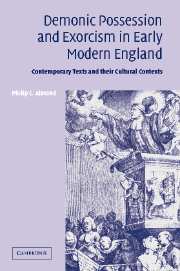 Demonic Possession and Exorcism in Early Modern England
Demonic Possession and Exorcism in Early Modern England Published online by Cambridge University Press: 22 September 2009
In December 1596, Nicholas Starkie a gentleman of Cleworth in Lancashire visited the celebrated Dr John Dee, astronomer and alchemist of Manchester about the possession of a number of persons in his household. In February 1595, his daughter Anne and his son John, nine and ten years of age, began to show signs of possessions. Later three other children resident in the household, Margaret Hurdman, Ellinor Hurdman, and Ellen Holland, became similarly possessed. Eventually, a maid Jane Ashton, thirty years old, and a poor relation Margaret Byrom, thirty-three years of age, acted demonically.
John Dee had had experience of demoniacs. In August 1590 a nurse in his household, Ann Frank, had become possessed by an evil spirit which he had attempted to exorcise by prayer and (unusually) the anointing of her breast with holy oil. The exorcism was unsuccessful. Two weeks later she tried to drown herself in his well, and three weeks after that successfully cut her own throat.
John Dee, perhaps as a consequence wary of any direct involvement, counselled Nicholas Starkie to gain the assistance of ‘some godly preachers, with whom he should join in prayer and fasting for the help of his children’. And it was upon this advice, and having heard the story of Thomas Darling, that Starkie sought the services of John Darrell and George More.
John Dee also called in Edmond Hartley, a witch, whom he sharply reproved.
To save this book to your Kindle, first ensure no-reply@cambridge.org is added to your Approved Personal Document E-mail List under your Personal Document Settings on the Manage Your Content and Devices page of your Amazon account. Then enter the ‘name’ part of your Kindle email address below. Find out more about saving to your Kindle.
Note you can select to save to either the @free.kindle.com or @kindle.com variations. ‘@free.kindle.com’ emails are free but can only be saved to your device when it is connected to wi-fi. ‘@kindle.com’ emails can be delivered even when you are not connected to wi-fi, but note that service fees apply.
Find out more about the Kindle Personal Document Service.
To save content items to your account, please confirm that you agree to abide by our usage policies. If this is the first time you use this feature, you will be asked to authorise Cambridge Core to connect with your account. Find out more about saving content to Dropbox.
To save content items to your account, please confirm that you agree to abide by our usage policies. If this is the first time you use this feature, you will be asked to authorise Cambridge Core to connect with your account. Find out more about saving content to Google Drive.